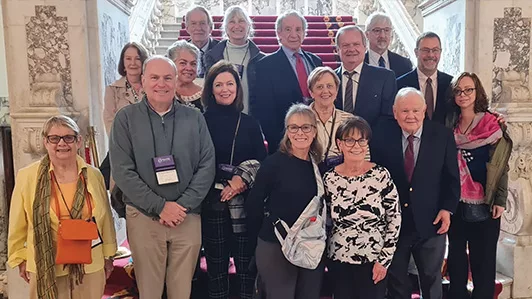
In October 2023, I was pleased to lead a delegation of 16 lawyers and guests who traveled to Ireland at a unique time in its history with the goal of strengthening and supporting the bonds between the legal communities of the United States and Ireland.
We had a particular focus of discussing the conflicts Ireland has endured and the conflict resolution process that brought about the current delicate peace. The road to peace, we found, was very difficult and paved with animosity, dislike, violence, and bloodshed.
We went to discover the truth about this conflict, and in the end made large strides toward that goal. After a 30-year conflict, referred to as the Troubles, Northern Ireland and the Republic of Ireland arrived at the Good Friday Agreement on April 10, 1998.
This agreement effectively stopped the violent 30-year conflict between the two sides. The goal of the “unionists” was to remain part of the United Kingdom. This territory is referred to as Northern Ireland and is still mostly Protestant. The goal of the “nationalists,” also known as “republicans,” was to become part of the independent Republic of Ireland, which is mostly Catholic.
However, we found that this was not a religious conflict but rather one of national identity and territorial belonging.
We found that the violence was carried out mainly by paramilitary forces, security forces, and British soldiers on behalf of the unionists; and the Irish Republican Army (IRA) on behalf of the nationalists. We were witnesses to the deep feelings still harbored by both sides. Killings during the Troubles exceeded 3,600, and it is estimated that at least 50,000 people were physically injured or maimed.
We were told that the Good Friday Agreement was brokered primarily by U.S. Sen. George Mitchell, President Bill Clinton, and British Prime Minister Tony Blair, and took two years of negotiations. This agreement stopped the violence but not the deep feelings, resentment, and even hatred on both sides. Our delegation concluded that it may take another generation for these feelings to subside.
We found Ireland to be a beautiful country and now understand why it is called the Emerald Isle. We began our journey in Dublin in the Republic of Ireland, then went to Belfast and Derry in Northern Ireland. We found these cities to be treasures with open, caring people who have suffered much and who welcomed us warmly.
We met with Irish people going about their everyday lives, lawyers, policymakers, law school professors, bar association leaders, nuns who were witnesses to the Good Friday Agreement, members of Parliament, and combatants of the Troubles from both sides who had served time in prison for their actions during the Troubles. We learned about the roles of the IRA and the British security forces, such as the British Army, in the conflicts and about the numerous ceasefires and agreements, as well as Bloody Sunday.
Along with our guests, we also took time to partake in the enduring culture of Ireland, such as having a traditional Irish bread-making session at Tracy’s Farmhouse, and scenic tours of Belfast and Dublin. The guests enjoyed a visit to the Titanic Museum and were shown how the Titanic was made. They had high tea and much more. The entire trip was magical and memorable to all of us that went.

Austin Bar members Judge Orlinda Naranjo (front, center), Richard Pena (second from right, second row), and Randy Chapman (left, back row) attended Pena’s legal delegation to Ireland in October 2023.
Among the meetings that especially stand out in my mind are: the president of the Law Society of Northern Ireland; Martina Purdy and Elaine Kelly—two nuns with firsthand experiences of the Troubles and the Good Friday Agreement; members of the Northern Ireland Assembly—one of whom was a political prisoner and former British soldier; and the energetic professors at Queens University Belfast School of Law. We also attended a panel discussion with the leading civil rights lawyer in Ireland, Padraig O’ Muirigh.
Of course, we were all moved during our walk along Peace Wall, which divides the nationalist and unionist areas in Belfast, and we were told that the wall brings security by preventing flare-ups of violence by the two sides.
Our delegation traveled to Ireland at a historic time as the House of Commons in London had just passed a highly controversial bill referred to as the Legacy and Reconciliation Bill.
During the Troubles, Protestants and Catholics fought against each other, but this bill has united Protestants and Catholics against it, as it prohibits legal remedies for the families of those killed during the Troubles on both sides.
Currently, there are 1,800 unsolved Troubles-related deaths in Northern Ireland, including 1,400 pending police investigations.Instead of judicial accountability, an independent commission will be formed that can provide conditional immunity to perpetrators who step forward and offer self-incriminating evidence.
Emotions are high over the passage of the bill, and, contrary to the stated purpose, it does little to put the past behind the Irish people.
Ireland is a beautiful and complex country full of genuine, caring people who have suffered much and are struggling to put the past behind them. Everyone we talked to said they do not want to go back to how it was and are very mindful of the delicate peace.
Special thanks goes to the wonderful delegates who were excellent representatives of our legal community; to my co-leader, Carolyn Malley Pena; and to Nanda Journeys, which did an outstanding job in arranging meetings and coordinating our adventure.
